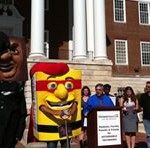
College students are going without required textbooks, doing their best to eke through the semester without shelling out hundreds in their campus bookstores. With inexpensive alternatives sparse, a group of college activists—backed by the Obama administration—is railing against skyrocketing textbook prices … one campus at a time.
The Textbook Rebellion, a nationwide tour of 40 campuses in 14 states during the fall semester, kicked off Aug. 31 at the University of Maryland’s (UMD) College Park campus, where officials from the Student Public Interest Research Groups (PIRGs), student leaders, and an Obama administration official rallied for more open-source textbook options, both online and in print, that could trim students’ annual $1,000 book bill.
Textbook Rebellion launched a website that collects petition signatures aiming to show the widespread support for course textbooks that cost $30 or less, including online books that can be converted to traditional texts through an inexpensive printing process. Student PIRG officials said they hope to collect 10,000 signatures over the next six weeks.
Hal Plotkin, a senior policy adviser for the U.S. Department of Education (ED) who addressed students and reporters gathered outside UMD’s McKeldin Library, said encouraging and incentivizing more open-source textbooks would be a key piece of President Obama’s goal to lead the world in college graduates by 2020.
Plotkin, a central figure in the White House’s plans for more free open educational resources, said the administration would soon unveil “substantial grants” for companies and educators willing to create textbooks that could be used on campuses nationwide.
Samantha Sperling, a UMD sophomore and the campus’s chapter chair of MaryPIRG, said that the costs of textbooks—even on a large campus with students committed to myriad causes—has long been a concern for any student who has to buy a $200 biology or psychology book.
“This is the one issue that students universally care about,” she said, adding that MaryPIRG has shared survey results with UMD’s administrators showing many students go without required books because they’re too pricey. “Book prices should never be a barrier to knowledge.”
Textbook prices have risen by about four times the rate of inflation since 2000, according to federal statistics. Seven in 10 student respondents to a recent Student PIRG survey said they hadn’t purchased at least one assigned textbook due to high costs. Of those students, eight in 10 said their grades would suffer without the necessary books.
Jimel Scott, a junior at the University of Maryland’s College Park campus, said the rising cost of books has diluted some classmates’ higher education as they try to get by each course without books listed on professors’ syllabi.
“They just fake it and hope they make it,” said Scott, who spoke at the Textbook Rebellion rally, accompanied by the group’s costumed mascots, the mogul Mr. $200 Textbook and his foil, Textbook Rebel. “But they know, and I know–you can’t do your best in class without the right resources. … It’s gotten to the point where you actually dread going into the bookstore every semester.”
Used books available on low-cost websites like BookRenter and Chegg, Scott said, aren’t always useful. When professors require a brand new edition of the course’s textbook, a student can’t use last year’s version, which might cost a tenth of the newest iteration.
“With every new [book] edition, publishing companies win and students lose,” she said. “That’s not right.”
In the Student PIRG survey tallying the percentage of students who go without textbooks, many respondents said they often can’t recuperate any of the high costs of their books by selling the book back at the end of the semester.
Eighty-one percent of students said a new edition of their textbook had impacted the resale value, and about half said the textbook had been “customized for use only at your school.”
Plotkin, the ED official who joined the Textbook Rebellion, said department decision-makers would continue to view open textbooks as “a critical tool” in making higher education more affordable and increasing the country’s college graduates over the next decade.
Advocates for open educational resources for K-12 schools and colleges and universities lauded Obama’s 2009 selection of Martha Kanter as the Undersecretary of Education after Kanter expressed public support for a California law that aimed to bolster textbooks available for free to low price.
The Textbook Rebellion event included examples of how faculty members concerned with the high price of books could provide affordable texts for their students.
Charles Stangor, a psychology professor at UMD, wrote an open textbook for his Introduction to Psychology course using the alternative publishing company Flat World Knowledge, meaning the class’s 800 students this fall can buy their required textbook for minimal cost or read it for free online.
“I think it’s fair to say that every faculty member and administrator on this campus thinks books cost too much. No one is denying that,” Stangor said. He added that his textbook was peer reviewed by a dozen faculty members from across the country before it was made available through Flat World Knowledge.
Stangor said he hoped his UMD colleagues would follow suit and make their own books available as an open resource, while conceding that he hadn’t yet become an open-textbook activist.
“It’s an individual decision,” he said. “If they want to [publish an open book], they should. … I don’t try to lobby them at all.”
- Research: Social media has negative impact on academic performance - April 2, 2020
- Number 1: Social media has negative impact on academic performance - December 31, 2014
- 6 reasons campus networks must change - September 30, 2014

Comments are closed.